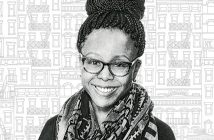Rosevelie Márquez Morales ’02 makes sure there’s room enough for everyone to succeed.
Born in Puerto Rico and raised in Brooklyn, Rosevelie Márquez Morales lacked many of the formative opportunities that all but guarantee success for the most fortunate in America. But Márquez Morales handily beat socioeconomic odds through diligence, perseverance, and force of will. She became a lawyer who, having climbed her own summit of success, has turned her attention to underrepresented communities in order to inspire women and people of color to reach the heights of their potential.
“Education, training, and continuing dialogue are the three main tactics to help law firms grow,” says Márquez Morales, who, understanding that high-achieving law firms tend to lack diversity, works for greater representation of underserved communities in the legal field.
Márquez Morales currently serves as East Coast diversity director at Sidley Austin LLP, where she promotes the firm’s diversity and inclusion efforts through the recruitment, retention, and training of women and diverse lawyers. Some of the initiatives include programming and training related to professional development, mentoring, and strategizing on ways to create, manage, and lead inclusive teams.
Above all, Márquez Morales strives to give underserved individuals what she did not have in her own early life and career: mentors who can offer advice and assist in identity formation while managing their own professional development.
“One of the greatest challenges for me was not originally having mentors,” she says, remarking that women and people of color often lack, in addition to mentors, strong resources and networks. “The goal is to create opportunities for all.”
Though initially lacking a formal mentoring network, Márquez Morales did have the benefit of growing up around two strong female role models: her mother, Evelyn, and her aunt Lourdes. Evelyn had been the victim of domestic violence, and her experience motivated Márquez Morales to want to be an advocate and instilled in her a strong sense of independence. Her aunt, a teacher and school counselor in Puerto Rico, valued education and had a great appreciation for travel. According to Márquez Morales, hearing about her aunt’s travels helped her visualize possibilities she had never before imagined and inspired her own travels.
“She made me realize there’s a whole world to explore outside the confines of my small Brooklyn apartment,” she says.
Following in her mother’s and aunt’s footsteps, Márquez Morales now serves as a role model to her two young daughters, Savannah and Delilah. Because Márquez Morales has achieved professional success, her daughters are able to enjoy privileges that their mother went without as a child.
“Being women of color does not have to be an impediment for my daughters,” she says. “They can achieve what they want to achieve.”
Achievement for Márquez Morales has unfortunately come with some insidious stings along the way. She recalled one instance when she entered a conference room dominated by older white men. Though the court reporter’s chair was already occupied by the real reporter, Márquez Morales was nonetheless asked to sit down there by one of the men, who assumed that she could not be a lawyer. Márquez Morales corrected him before taking her rightful seat among her lawyer peers. While the offending man was embarrassed and appropriately apologetic, Márquez Morales stresses how these types of occurrences related to her race and gender reveal that there is much progress still to be made.
Despite these incidents of bias, Márquez Morales has succeeded at every stage of her life. After graduating first from Barnard College and then Fordham Law, she worked at Harris Beach PLLC, initially as an associate, on complex litigation matters, and later as a partner/co-chair of the diversity council, supervising the firm’s initiatives to promote inclusivity. Márquez Morales says that the firm provided her with invaluable skills, and, after a too-long wait, her first professional mentors.
While grateful for her experiences with Harris Beach, Márquez Morales wanted to switch her attention from
client to community. Considering her strong desire to fight on behalf of individuals, she knew she could achieve her deepest sense of fulfillment only by striving to empower underserved communities—namely, women and people of color.
“Community advocacy has been the core of my aspirations since high school,” she says. “I went to Fordham Law with the ultimate goal of making an impact on my community.”
In addition to managing diversity initiatives at Sidley Austin, Márquez Morales engages in various volunteer work aimed at promoting inclusivity in the legal world. Currently she serves as president of the Sonia & Celina Sotomayor Judicial Internship Program, which places high school and law school students of diverse and under-
represented backgrounds in judicial internships in state and federal courts. The program also offers educational workshops and mentorship opportunities to empower the students to excel in their work.
“We needed to do more than just place them in the internships,” she says. “We wanted to cultivate and develop future leaders. You cannot aspire to be something that you have never seen. This is why exposure to our legal system is key to empowering students to make informed decisions about their future.”
Márquez Morales also chairs ASPIRA of New York, an organization dedicated to the social advancement of Puerto Rican and Latino youth. Founded in 1961, ASPIRA invites students to participate in leadership development activities and events that promote academic excellence, community commitment, and cultural pride. Márquez Morales, who participated in the program during her high school years, says the program inspires in its members the desire to succeed and nurtures the confidence they need to persist through difficult situations.
“The goal is to expose the students to new and stimulating experiences while also promoting cultural awareness and appreciation,” says Márquez Morales.
In the past, Márquez Morales has served in a variety of leadership roles, including as president of the Puerto Rican Bar Association, general counsel of the Hispanic National Bar Association, chair of the Defense Research Institute’s Diversity Committee, and co-chair of the New York State Bar Association’s Committee on Diversity and Inclusion.
When asked about further work that must be done to promote equality, Márquez Morales stresses that honest dialogue and interpersonal advocacy can help foster more inclusivity.
“We have to educate people to know that everyone has biases that influence one’s practice,” she says. “It’s up to all of us to stand up for everyone, even if they’re not in the same room.”




